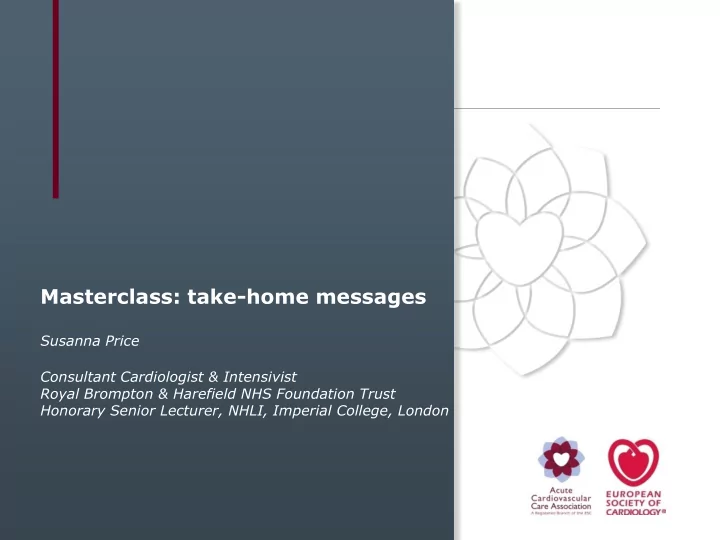

Masterclass: take-home messages Susanna Price Consultant Cardiologist & Intensivist Royal Brompton & Harefield NHS Foundation Trust Honorary Senior Lecturer, NHLI, Imperial College, London
Chest pain • Biomarkers: ?identify those at high risk who may benefit from early/aggressive intervention • But: • You can be too early • Troponin assays require intelligent application – individualised to the institution and the patient
Chest pain • Atypical chest pain – ‘arrogance and ignorance of cardiologists’ • Do we need CPUs?: Probably not • Do need shared protocols and policies with our ED colleagues • Not all CP is cardiac •
Cardiac arrest • OHCA: • Significant improvement in outcomes (short and long-term) over years • Commonest cause of death • MOF in first 3 days • Neurology thereafter • Coronary angiography is recommended for all – as many have CAD • Increasing potential for MCS • eCPR (refractory cardiac arrest) – with ongoing trials • Post-arrest cardiogenic shock
Cardiac arrest • No treatment has been shown to improve outcome in MOF • Brain: • all drug trials thus far negative (cyclosporine, GNP1 etc) • ?Xenon in the future • TTM (how low, how long, how? TTM2 results awaited) • Neuroprognositcation • Wait – and use multimodality assessment
Cardiac arrest • ECMO: ‘need to be able to say no, as well as yes’ • Ethical issues in the current era of MCS challenging – ECMO heralds a new era of defining death
AHF • Registry data: state of HF management in 2017 1-year overall mortality 35.9% • Drop-off in evidence-based disease modifying agents from mid- 50’s - but • prescribing rates increasing <50% admitted to cardiology ward (but ok if see cardiologist – in-patient • mortality 6%) ?why no improvement in mortality: ?older ?no new drugs •
AHF: common errors GPs: think respiratory disease is the commonest cause of • dyspnoea in the elderly ED: diagnosis of HF alone is not enough – worry about the • underlying cause HF specialists: think they can diagnose/exclude HF clinically - • they cannot Sepsis: precipitant of AHF in around 30% cases •
AHF: present and future • >210 AHF trials in progress currently • Most recent: serelaxin – negative • Inotropes – ATOMIC HF – increased troponin levels • CUPID2 – neutral for every endpoint • Ultratide (TRUE HF) – no difference in outcome
Cardiogenic shock • Endpoints and definitions not clear • RCTs lacking • Inotropes • Ventilation • The right heart • MCS • Awaiting Holger’s next trial results for multi -vessel revascularisation • Really need consensus regarding the whole spectrum of the disease process and interventions
Cardiogenic shock: the future? • Uncertain outlook for future trials • MCS • Inotropic agents • Any intervention whatsoever • Avoid if possible
Lessons from surgery?
Spread to devices? • Concept that just being safe isn’t enough – needs to be effective
Adoption & diffusion: lessons from surgery?
Many interventions seem physiologically/intuitively sensible – but that doesn’t mean they are right Sir Iain Chalmers, co-founder Cochrane collaboration, BBC Radio 4, 2013
Recommend
More recommend